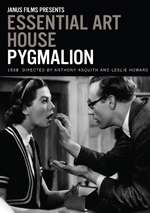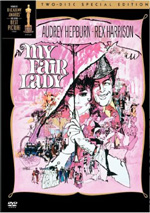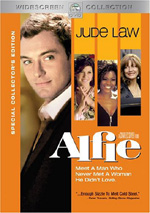|
CRITERION
|

| |
|
MOVIE INFO
|
|
Director:
Anthony Asquith, Leslie Howard
Cast:
Leslie Howard, Wendy Hiller, Wilfrid Lawson, Marie Lohr, Scott Sunderland, Jean Cadell, David Tree
Writing Credits:
George Bernard Shaw (play, scenario, dialogue), W.P. Lipscomb (scenario), Cecil Lewis (scenario)
Tagline:
He picked up a girl from the gutter - and changed her into a glamorous society butterfly!
Synopsis:
Cranky Professor Henry Higgins (Leslie Howard) takes a bet that he can turn Cockney guttersnipe Eliza Doolittle (Wendy Hiller) into a "proper lady" in a mere six months in this delightful comedy of bad manners based on the play by George Bernard Shaw. This Academy Award-winning inspiration for Lerner and Loewe's My Fair Lady was directed by Anthony Asquith and star Howard, edited by David Lean, and scripted by Shaw himself. Criterion presents Pygmalion in a beautifully restored digital transfer.
Box Office:
Budget
$350 thousand.
MPAA:
Rated NR
| |
|
DVD DETAILS
|
Presentation:
Fullscreen 1.33:1
Audio:
English Monaural
Subtitles:
English
Closed-captioned
Supplements Subtitles:
None
Runtime: 95 min.
Price: $19.95
Release Date: 2/10/2009
Bonus:
• Booklet
| |
|
PURCHASE @ AMAZON.COM
|

| |
|
EQUIPMENT
|
Panasonic 50" TH-50PZ77U 1080p Plasma Monitor; Harman/Kardon DPR 2005 7.1 Channel Receiver; Toshiba A-30 HD-DVD/1080p Upconverting DVD Player using HDMI outputs; Michael Green Revolution Cinema 6i Speakers (all five); Kenwood 1050SW 150-watt Subwoofer.
| |
|
RELATED REVIEWS
|


| |
[an error occurred while processing this directive]
|
Pygmalion: Criterion Essential Art House Collection (1938)
|
|
Reviewed by Colin Jacobson (February 17, 2009)
In the interesting essay featured in a prior DVD's booklet, film critic David Ehrenstein writes, "There's a saying that goes: A definition of an intellectual is someone who can listen to Rossini's 'William Tell Overture' without thinking of The Lone Ranger. Were that notion expanded to include anyone who can experience (George Bernard) Shaw's Pygmalion without humming the melodies of 'I Could Have Danced All Night' or 'I've Grown Accustomed to Her Face', millions more would fail the test."
Add me to that roster of failures. As I screened 1938's Pygmalion, I couldn't help but reflexively flash back to the musical wonders of 1964's My Fair Lady, the hit film based on Shaw's original. This occurred less because my familiarity with Lady is so great - I've seen it only a couple of times - but more because my memory of it is so fresh. I just took in Lady for the first time about two months before my initial screening of Pygmalion, so I retained a vivid impression of it.
As my review of Lady related, I found it surprisingly enjoyable, mainly because of the solid story behind the tale. Shaw created a fine piece with his semi-rags to riches fable, and it held up well even in the face of umpteen musical numbers; the songs in musicals are the reason I don't like the format, but I enjoyed Lady despite the excessive number of ditties.
Interestingly, Pygmalion largely answers a question I had about Lady and other musicals: how long would these suckers be if one removed all of the songs? About 95 minutes, apparently, since the action in Pygmalion seems to encompass virtually all of the non-musical moments found in Lady. In theory, that means the songs of that film occupied about 78 minutes of screen time. Hmm… that actually seems like too low an estimate, but it might be right.
Overall, I rather enjoyed Pygmalion, though I don't feel it's as good as Lady. The two stories are virtually identical; some elements of Lady may not have appeared in Pygmalion, but if so, I couldn't recall them, as both tales seemed to cover exactly the same territory.
The basic tale: language professor Henry Higgins (Leslie Howard) bets that he can transform lower-class wench Eliza Doolittle (Wendy Hiller) into a facsimile of a "proper lady" within half a year. The story follows the generally comic triumphs and travails experienced in that period.
Both Eliza and Higgins provide solidly entertaining characters, though neither seems especially realistic. However, I didn't mind that element, as the actions are played for such good comedic effect that I fully accepted their mildly unbelievable eccentricities.
I also liked the fact that Pygmalion is a surprisingly unsentimental production. As they interact in largely cantankerous ways, it's clear that Higgins and Eliza develop affection for each other, but the film doesn't go for broad, sweeping love or adoration. By the end of the movie, we see mild, grudging signs of attachment; we suspect a romance may bloom, but we don't get any kind of strong statement in this regard.
One way in which Pygmalion seems to improve upon Lady stems from the ages of the participants: Howard and Hiller appear to create a more age-appropriate couple than would Rex Harrison and Audrey Hepburn. The two Pygmalion actors look fairly close in age, but there's clearly a large gap between Harrison and Hepburn.
In reality, however, it turns out that the gaps are pretty consistent for both films. Howard was 19 years older than Hiller, whereas Harrison was born 21 years prior to Hepburn; those are pretty consistent differences. However, 45-year-old Howard looked younger than his age, while 26-year-old Hiller appeared older, while 35-year-old Hepburn seemed younger than that but 56-year-old Harrison presented himself as about that age. As such, the inference of romance between Pygmalion's actors was more believable to me.
For the most part, however, I preferred Lady to the original, mainly because - age differences aside - I thought the musical's actors offered better turns. Ironically, the performances in Lady are broader than those in Pygmalion, and I usually prefer the more subdued work. However, the mildly emotive acting of Lady seems quite appropriate for the story, and it makes the fable more enchanting for some reason. It's such an unreal situation that the gentle excessiveness of the performers feels right to me, and for that reason, I enjoyed Lady more than I liked Pygmalion.
Nonetheless, the latter is a very solid film that I found to be compelling. Yes, it was tough not to make direct comparisons to its remake, but Pygmalion functions well on its own. It's a fine comedy that offers an enjoyable telling of the tale.
|
The DVD Grades: Picture D+/ Audio C+/ Bonus D-
|
|
Pygmalion appears in an aspect ratio of 1.33:1 on this single-sided, single-layered DVD; due to those dimensions, the image has not been enhanced for 16X9 televisions.
Although the picture often looked fairly decent, it clearly shows its age much of the time and presented a rather problematic image.
Sharpness generally seemed pretty good, with much of the film looking acceptably crisp and detailed. However, some softness interfered with the picture at times, and portions seemed fuzzy and hazy. Moiré effects were an occasional nuisance - mostly due to clothing patterns - and I also detected a few jagged edges on items.
Black levels were fairly deep and solid, though contrast seemed mildly weak; the gray tones appeared a little too murky and flat and lacked the boldness they should display. Shadow detail was acceptably clear but unspectacular.
As often occurs with transfers of old movies, print flaws caused the majority of the disc’s concerns. Speckles appeared very frequently, and I saw examples of scratches, nicks, spots, vertical and horizontal lines, and hairs. A few times during the film the image looked significantly uglier than usual; some scenes seemed much worse for wear than the rest of the picture, and those instances displayed notable flaws in all realms, including sharpness and contrast. While parts of the flick seemed decent, the nearly constant source defects left this as a “D+” transfer.
I felt more pleased with the monaural audio of the movie. Dialogue remained intelligible but came across as somewhat metallic. That was an artifact of the movie’s era, I thought; the lines could’ve been a bit more natural, but they weren’t worse than expected given their age.
Effects were also a little rough during much of the film, but again, these seemed to match most audio of the era. Music showed similar qualities. The score was bright but lacked depth and range. In terms of background noise, most of the film seemed pretty quiet; some bouts of noise distracted on a few occasions, but these were infrequent. At no point did this become a particularly strong piece of audio, but it was more than acceptable for its age.
How did the picture and audio of this 2009 “Essential Art House” release compare to those of the 2000 Criterion edition? Unfortunately, I was unable to directly compare the two; I gave away the original disc years ago and couldn’t find a copy to rent. Based on my comments in my original review, though, I suspect the 2009 disc is at least as good as the prior version and probably better. Both seem to offer similar visuals, but I found more problems with the old disc’s audio. Since I couldn’t directly compare the two, I can’t truly declare the new one to be superior, but I’d guess that it provides the better presentation of the two.
This DVD offers almost no supplemental features. While the original disc included an essay from David Ehrenstein, this one simply includes some short production notes from Michael Koresky. He gives us a few interesting tidbits, but we don’t learn much.
As a movie, Pygmalion is a lot of fun. Although I prefer My Fair Lady, the musical remake of the story, I still think that Pygmalion is an enjoyable piece. The DVD presents flawed picture, acceptable sound and no significant supplements. Pygmalion merits at least a rental, especially for fans of My Fair Lady who desire to see the inspiration for that film.
|
|
[an error occurred while processing this directive]
|
|

